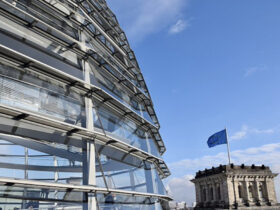On Feb. 24, 2022, Russia invaded Ukraine. In the following months, Europe has fallen into an energy crisis resulting from Russia withholding its natural gas supply and European countries being unwilling to economically support Russia’s invasion by purchasing natural gas. Consequently, many countries have struggled to find an immediate, alternate source to offset the sudden energy deficit. This has created energy shortages across Europe and driven prices up. As a result, many governments have returned to their most reliable energy source: fossil fuels.
Heading into COP27, the European Union was supposed to bring updated plans for carbon reduction since last year’s COP26. Now, in the middle of the energy crisis, some European countries are being forced to renege on past promises or change direction.
For example, Germany, intended to close the last of its coal-fired power plants by the end of 2022 in order to keep on track for its 2030 coal phase-out goal. However, as Germany used to receive 55% of its natural gas from Russia, the war left it with a significant gap to fill. So, Germany has postponed the closure of or reactivated at least 20 of coal power plants to support their energy demands. Italy, Hungary, Greece and the Netherlands all also announced plans to postpone the closure of some power plants or re-open others. A proposed compromise for this decision suggests investing the earnings of these power plants toward constructing more sustainable energy sources, such as wind turbines and solar panels, but there are concerns that the German government isn’t doing enough to ensure this actually happens. Environmentalists in Germany reportedly understand the necessity of ensuring that there’s enough energy for the winter but assert that the extra carbon burned must be somehow offset elsewhere in the country.
Poland also received a significant amount of natural gas, about 45% of its supply, from Russia before the war and was similarly cut off following Russia’s attack. As a result, Poland announced plans to slow their coal phase-out but maintained that the phase-out would be complete at the originally scheduled time of 2049. They said that in this time of crisis, they don’t want to be forced to rely on expensive imported coal and would rather increase their domestic production. Poland is the only EU country that uses coal as its primary source of electricity, so before it can convert to other sources, it will require a supply of coal from somewhere, whether that be from its mines or from imports.
Eventually, Poland hopes to diversify their energy sources. The country recently announced its cooperation with U.S. and South Korean companies to construct nuclear power plants. However, Poland stated that no coal mines would close until the first of these plants opened, which won’t be until 2033 at the earliest.
Alternatively, Romania has been pushing to increase its solar and wind energy generation to gain independence from Russian energy sources. A new solar project is set to be the biggest solar photovoltaic plant in Europe, with 1.6 million new solar panels supplying power to more than 370,000 households. The plant, which will also include energy storage capabilities, should be online by 2025. The same company, Rezolv Energy, is also looking to build a wind farm. If Romania generates enough renewable energy, it could even share its supply with other European countries. This would be a major feat, but Romania, in particular, is well poised to fulfill it as the nation has a high solar energy potential with 210 sunny days out of the year.
The effects of the energy crisis are not contained to Europe. With big European economies suddenly searching for energy, prices have soared globally at the expense of developing countries. Their supply of natural gas has drastically decreased, as it is now exported to Europe. Natural gas suppliers are disregarding their previous contracts in favor of the prices offered by European countries, prices that allow them to pay the penalties for breaking their contracts and still make a profit. Thus, Europe’s energy crisis has become an energy crisis for developing countries with smaller economies, such as Pakistan, Bangladesh and Thailand.
Accordingly, Russia has approached Pakistan, India and other countries that have faced an energy deficiency and offered their supply of natural gas. Leaders are trapped in a similar situation to Europe’s: boycotting Russia and supporting the environment or meeting the immediate energy needs of their citizens?
To avoid pushing developing nations into Russia’s arms, European countries need to work together with gas suppliers and economically smaller countries to establish a more fair distribution of wealth and supplies. They could do so by supplying funds for developing countries to funnel towards procuring other energy sources or put funding towards becoming competitive in the market for natural gas. Alternatively, regulations could also be put in place to control the price of natural gas or limit the profit made by suppliers in order to make the supplies more accessible to smaller economies and force the suppliers to honor their long-term contracts. There is no easy solution, as there is a severe global shortage of supply, but there are measures that can be put in place to minimize the damage to people and the environment.
Russia’s invasion of Ukraine has had many far-reaching and devastating consequences, including Russia’s manipulation of its energy sources as a weapon, resulting in an energy crisis worldwide. This shortage may cause potential loss of life or livelihood in the coming winter and has also impacted the climate and climate goals heading into COP27. The hope is that despite these setbacks, European countries at COP27 will outline specific measures to ensure they still ultimately adhere to their initial climate goals. The conference will also ideally serve as an opportunity for negotiation of either financial compensation for developing countries or market legislation to ensure emerging nations aren’t forced to rely on Russian gas in order to survive the winter.







